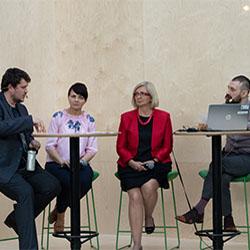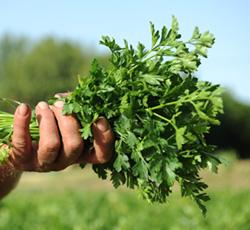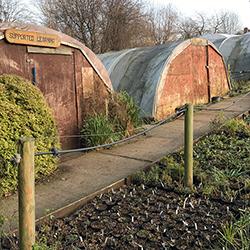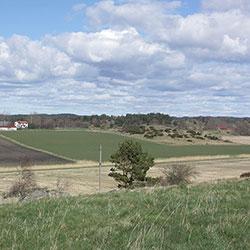
Research Forum Urban Rural Gothenburg
What is ‘Urban Rural Gothenburg’?
‘Urban Rural Gothenburg’ is a three-year (2017-19) EU-sponsored project for sustainable development with the overarching aim to create improved conditions for green innovation and green business development between the city and the countryside. Operating in five testbeds in four local hubs in north-eastern Gothenburg, the project seeks to develop and implement new low-carbon approaches to local development, with particular linkages to food, logistics, tourism, and ecological business models. Using this methodology, but also through cross-border cooperation between the municipality, the business sector, the residents, the civil society and academia (the so-called ‘penta-helix model’), ‘Urban Rural Gothenburg’ is thought to contribute to the fulfillment of Gothenburg’s 2017 sustainability goals. This involves combining innovations for social improvement with a reduction of environmental and climate impact to become a sustainable city of globally and locally equitable emissions.
‘Urban Rural Gothenburg’ is funded partly by the European Regional Development Fund (ERDF) via The Swedish Agency for Economic and Regional Growth (Tillväxtverket) and is led by Business Region Göteborg (BRG) in collaboration with seven other municipal units as partners and co-financers. The project targets primarily small- and medium-sized enterprises by making use of the local communities in north-astern Gothenburg and their socio-economic potential to transition into a more sustainable society. The targeted companies are chiefly to be related to the food value chain "from farm to table", which involves not only food producers, conveyors and logisticians, but also distributors, marketing, communications and IT specialists, stores and local markets, restaurants, hotels and other tourism-related businesses, as well as recycling and knowledge enterprises. In other words, ‘Urban Rural Gothenburg’ is meant to serve as an accelerator for circular economies and green business development with a strong local anchoring.
What is Research Forum ‘Urban Rural Gothenburg’?
Research Forum ‘Urban Rural Gothenburg’ constitutes Mistra Urban Futures' contribution to the project ‘Urban Rural Gothenburg’, forming its academic component within the aforementioned penta-helix methodological model. Because the project’s funding is earmarked for the concrete implementation of the project rather than research-related activities, the role of the Research Forum is to fill this gap. This will be done by providing the research community with advice, support, consultancy, networks and a communication platform with the purpose to initiate and implement research endeavors related to the project’s objectives. Another important task of the Research Forum is to ascertain that the activities within ‘Urban Rural Gothenburg’ are scientifically sound. This will be achieved through constant monitoring of national and international activities that may be of interest for the project, including those at the five existing platforms of Mistra Urban Futures in Gothenburg, Skåne, Cape Town, Sheffield-Manchester and Kisumu. Compilation and dissemination of results through recurring seminars, workshops and special issues in scientific journals form an indispensable step towards that goal.
Conceptual rationale
As scholarly evidence continuously suggests, the concepts ‘rural’ and ‘urban’ are increasingly recognized in social sciences as cultural constructs rather than sets of geographically bounded spaces. Steady, fast-paced transformations in the environmental, economic and social dimensions have rendered simple spatial classifications inadequate to social and planning theory, especially those rooted in a an old dichotomous imaginary that defies contemporary reality of interconnectedness. However, although ‘rural’ and ‘urban’ today should perhaps best be understood as ‘categories of thought’, ‘narratives’, or ‘conversational realities’, they continue to underpin large sectors of societal organization as acceptable guiding perspectives. The point is that due to increasing rural-urban blurring and the lack of satisfactory working definitions, there is an ever greater likelihood that separate treatment of “rural” and “urban” in policy and planning may get in the way of making informed analyses and sound development decisions.
‘Urban Rural Gothenburg’ fully embraces these scholarly insights by a desire to argue against the domination of polarizing categories and instead fostering explorations of the middle ground: to deconstruct pernicious divisions and to create new hybrid syntheses containing the best elements of both.
Developmental rationale
An important component of the project ‘Urban Rural Gothenburg’ is its specific socio-economic context. As mentioned, the project is geographically tied to the northern districts of Gothenburg, where the four hubs are located (Backa/Brunnsbo, Angered, Hammarkullen and Bergum/Gunnilse). While the area offers ample resources and immense opportunities, it at the same time remains one of Gothenburg’s most segregated. The level of unemployment is markedly higher than in the rest of the city, the percentage of individuals with non-Swedish backgrounds is significant, there is a very high share of local students failing to pass the ninth grade with satisfactory marks, while crime statistics place the area among the most afflicted ones in the region. . In view of the ongoing migrant crisis, the North-East also receives almost every second newly-immigrated resident, while the precarious housing shortage locks in a depressing pattern of poor living conditions, ill health and uncertain future outlooks. All these factors create a situation where life expectancy is 9 years lower compared to other Gothenburg neighborhoods.
Onto this arena enters the project ‘Urban Rural Gothenburg’, although with a strikingly different agenda. Rather than yet again rehearse familiar ‘immigrant policies’ based on outworn socio-cultural references, the project consciously defers from this debilitating rhetoric and instead launches a completely new approach set out to increase the area’s level of self-sufficiency and to break negative mental patterns. By locally mapping out existing competences within green entrepreneurship, but also by providing opportunities to acquire new skills and testing new solutions, the project aims to spawn more sustainable integrative efforts under a positive, pro-active, ecological banner. Realizing that the need for resilient solutions for the area will continue to task policy-makers for many years to come, ‘Urban Rural Gothenburg’ does not aspire to solve the area’s multilayered problems, but rather seeks to act as an inspirational way forward with beneficial outcomes for every citizen, both locally and globally.
With that in mind, the Research Forum extends a special welcome to initiatives concerned with successful implementation of ecologically oriented solutions in socio-economically challenged areas.
Read more
Urban Rural Gothenburg project page (in Swedish)
Photo by Markus Spiske on Unsplash







